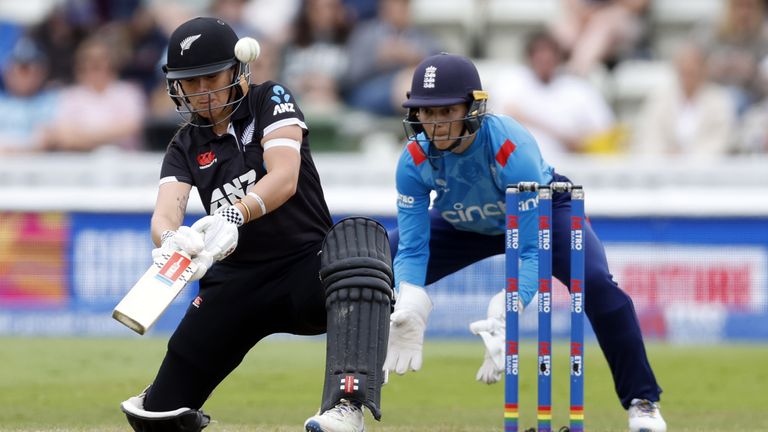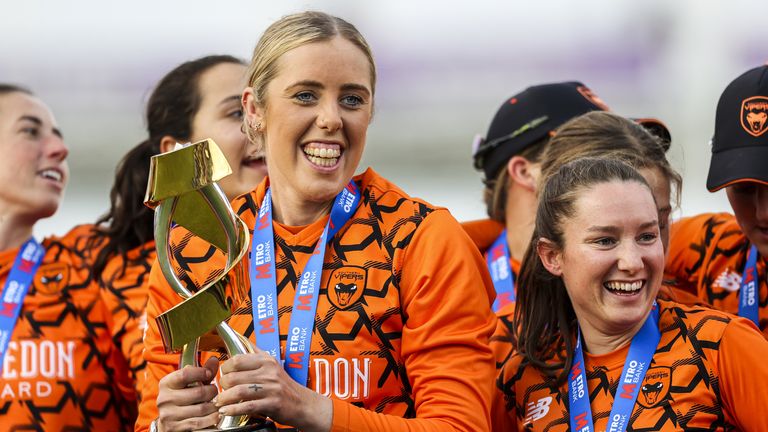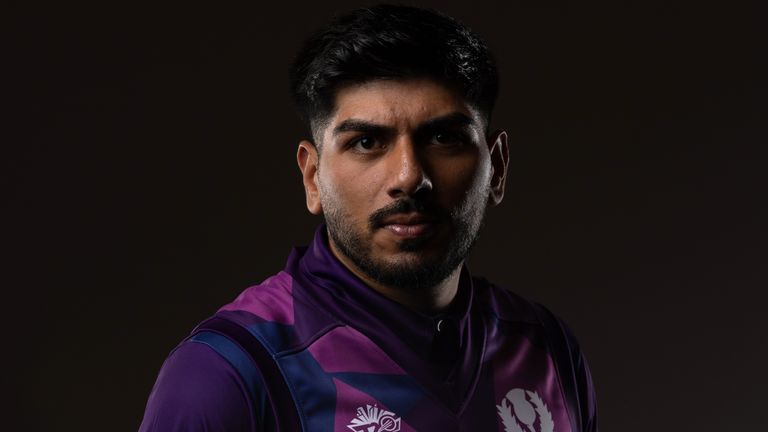Southern Vipers captain Georgia Adams spoke to Sky Sports News about her journey as an LGBT+ cricketer, the valuable advice she received from her grandmother, and why we need more inclusive environments around the country…
Cricket is currently celebrating Rainbow Laces from June 29 to July 7 to show its support for the LGBT+ community.
England Women and New Zealand Women wore rainbow laces and played with rainbow stumps in their ODI victory on Sunday. The ECB, first-class counties, the women’s regional teams and recreational clubs are all involved too.
Teams will support the seventh year of cricket’s Rainbow Laces campaign in the Vitality Blast, Rachael Heyhoe Flint Trophy and County Championship fixtures.
“Everybody should have the right to feel comfortable in their own skin whether in sport, work or day-to-day life,” Adams told Sky Sports News reporter Evie Ashton.
“If you want to get the most out of people you want them to be happy with who they are, and feel they have a safe environment. It did me the world of good.”
The 30-year-old all-rounder led Southern Vipers to five titles across the Charlotte Edwards Cup and Rachel Heyhoe Flint Trophy, as well as captaining Southern Brave to their maiden Hundred title last year.
Adams believes growing up in Brighton, known for its LGBT+ inclusivity, helped her to come out while at Loughborough University.
“[At university] the space of multiple sports combining allowed you to be yourself. Everyone was incredibly accepting and understanding of how each other wanted to identify or experience their sexuality.
“I knew my Mum was coming up to visit and I didn’t trust my mates to not drop something in there or make a joke about someone I’d been with,” she laughs.
“So, I plucked up the courage to tell [my family]. I said I’m not necessarily a lesbian but equally it is something I’ve explored so I wanted them to be aware and they were brilliant.”
Despite her positive experience compared to many, Adams couldn’t escape the societal pressures that often reinforce that heterosexuality is the norm.
“It does always come with pressures and difficulties when you come home or when you’re mingling with family and friends,” she said.
“When I would do things with my partner and our family, people would often go, ‘Oh who’s this?’ And you feel that sense of awkwardness because you don’t know how someone else is going to take it.
“Nothing really prepares you for the pressures that come with [coming out].
“Defining yourself with a label was something that was difficult for me. Some LGBT+ people feel strongly they need a label to be themselves and for me it was not wanting to be pigeonholed into a specific label for going through the ups and downs of finding out my sexuality.”
In 2019 Adams was Sussex Women’s captain and became the youngest player to play 100 senior matches for the county. She also concluded a great campaign last year by being named the Rachael Heyhoe Flint Trophy Player of the Year and PCA Women’s Domestic Overall Most Valuable Player.
Her father is the former Sussex captain and England international Chris Adams, and he told her that her grandmother faced similar challenges. It is one of the many reasons Georgia Adams sees her as a role model.
Adams said: “It was a lot harder for that generation and my grandmother told me her mother said to her, ‘If you want to be successful in this world Lynn you need to marry a man and have children.’
“It’s sad that she then possibly was never truly happy for a long time. She felt when my Dad and his brother were old enough she could actually make a choice that was going to make her happy and know that they would be okay. She did which resulted in splitting with my Grandad.
“When you talk to people like that who felt they had to be a certain way to make it in the world it is sad. You wonder, are you holding back, or what could you have achieved had you been able to live the life deep down you wanted to live?
“When she passed away it was so lovely to see the amount of people I’d not spoken to in years who reached out who said, ‘I’m devastated. I can’t believe this.’ She had such a presence about her and was there for me through thick and thin.
“At the age of 20, I already had this incredibly close bond with my Nan and to explore this other avenue with her and have someone so open and so relatable close by who could listen to my story and offer me advice was fantastic.”
For Adams, cricket has been a safe and welcoming environment ever since she picked up a bat at the age of three.
“Cricket was a space where I could be really confident. Especially as a teenager I wasn’t massively confident in myself, and I was worried about what other people thought of me and my image.
“Cricket gave me an avenue where you and your mates would love you for who you are no matter what.”
“At Southern Vipers, one of our headline values is embrace and appreciate individuality because the last thing we want is someone holding back because they don’t feel like they can be themselves.”
“It’s hard enough to get performances out there as it is, so it’s an area we’ve really addressed and as captain of this group I’m incredibly proud.”
But Adams knows this is not the case across the whole of cricket, as she has reflected on the lack of out professional male cricketers with her father, who is now an England batting scout and Head of Cricket at Seaford College.
“When I was younger, my dad said ‘Please, please, please do not date a male cricketer. Promise me.’ After some of the things he heard and experienced in the dressing room as a player, in a way he’s probably chuffed to pieces [that I am LGBT+],” she laughs.
“The male culture is different, and they feel they need to be and behave a certain way to make it in pro sport. It’s tough for the guys.
“When he was coach of Surrey, he was really lucky to work with Steven Davies who was out in the men’s side.” (In 2011 the England and Surrey wicketkeeper became the first playing professional cricketer to reveal they are gay.)
“[My dad] said the most important thing in life is that we’re happy.”
Adams wants her positive experiences as an LGBT+ individual to become normal for everyone on and off the pitch.
“I was quite lucky on my journey with the environments I entered but I am very aware that not everyone has the same experiences,” she added.
“Creating as many positive influences and campaigns as possible, like the ECB’s Rainbow Laces, to show our support is really important.
“If we can make everywhere as inclusive and diverse and as accepting as the area I grew up in, hopefully more people will start to express themselves and get more out of life.”







